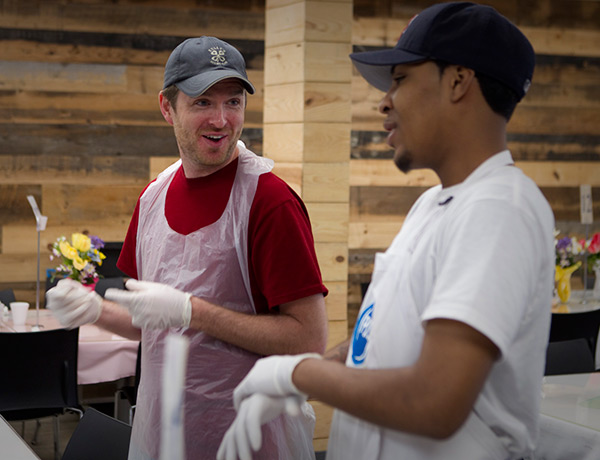By Linda Coutant | February 8, 2017
College campuses are often where frustrations over social justice, environmental and political issues take public stage – whether in the form of demonstrations, academic discussions or informal meetings.
Psychologist Dr. Bob Hill, who serves as Appalachian State University’s ombud, has observed college students’ angst over a number of issues since he began teaching in the early 1990s. Oftentimes, this manifests as political activism. Yet, he said students’ activism could often be more effective in working toward meaningful change.
“Students often don’t know how to start,” Hill said. “There are lots of huge issues to address in today’s world – women’s rights, LGBTQ issues, racial disparity in incarceration rates, international refugees, homelessness, environmental concerns or religious intolerance, for example – and what is needed for social change is a well-crafted, thoughtful approach to each.”
Appalachian’s Ombuds Office offers resources to connect students, faculty and staff with solutions – or ways to create solutions – in a localized, campus manner. From this perspective, Hill offers five tips for students wanting to turn their social passion into social change.
Educate yourself.
“Thoughtful and informed discourse should be applied to every issue,” said Hill. If an issue concerns you, whether it is environmental protection or personal liberties, learn as much about the issue as you can from different angles. Informed, rational action can be more effective than emotionally charged reaction. Taking time to become educated and emotionally centered on a problem can lead to ideas for possible solutions, he said. Educating others on an issue also is an effective strategy for social change.
Identify organized groups that support your concerns.
There’s no need to start from scratch when there may already be organized groups seeking the same goals you have. Align with them to make your voice heard, as they may have existing lobbying efforts for specific legislative action that address your concern. These organizations could include non-profits at the local, state, national or international level.
There may also be chapters of these groups or independent clubs and organizations on campus that address the issues that concern you, such as the Wine to Water and Habitat for Humanity clubs. If no group exists, then consider starting your own. View club directory
Local organizations, such as the Hunger and Health Coalition in Boone, are already collecting food from Appalachian’s dining halls and local restaurants and need student volunteers every day to help distribute the food. The Hospitality House offers food and shelter to those experiencing homelessness with the help of Appalachian student volunteers. Other local organizations count on student volunteers to serve vulnerable children, victims of domestic violence and other worthy causes. Learn more about community engagement
Engage in the legislative process.
Noise-making alone isn’t enough. “The legislative process is still an important way to make change,” Hill said. He recommends organizing formally with others and preparing a petition or a specific agenda for change – something tangible to take to a legislative body at the local, state or national level.
In what Hill calls “organizational competence,” students should discern who is responsible for making a desired change. If the push is for change on the Appalachian campus, become informed about who on campus has the authority to make changes in policy, procedure or decision making. It’s not always the chancellor. Very effective strides often can be made with lower-level decision makers, Hill said.
Not sure who to approach? Start by asking faculty or staff in the ACT Office, the Office of Campus Activities, Student Development, Dean of Students Office or Ombuds Office.
If the push for change is at a higher level, learn how state legislatures and/or Congressional processes work. In these situations, aligning with existing groups can be particularly useful, Hill said.
Learn more about state legislative processes
Learn more about Congressional legislative processes
Start a campus chapter of a national or international organization.
Some groups already have chapters on the Appalachian campus that engage student activism. If no campus chapters exist, consider bringing organizational representatives to campus to help educate others. This could be through a one-time event or a larger effort to start a chapter or a club or organization.
“Interested students can gather, organize and start a local chapter or campus group to support a cause they feel is important. They can recruit a faculty sponsor and obtain status as an Appalachian club if that might serve their goals,” Hill said. There are faculty on campus who are active with social justice, environmental and political process concerns who could serve as mentors and guides to help students channel educational efforts and activism. Hill encourages students to watch for campus initiatives and attend an event.
Expect a long-term effort.
Social change seldom involves quick solutions. “It requires steady, consistent effort to be effective,” Hill said. Expect to make some strides while experiencing a few setbacks.
In a society full of fast-paced communication, it can be easy to expect fast results. However, consider the modern gay rights movement, which some say began in 1969 with the Stonewall riots and continues even after marriage equality was granted by the U.S. Supreme Court in 2015. Likewise, the modern Tea Party movement is said to have begun in small meetings and living rooms nearly a decade before taking hold within the American political system.
An extra tip for educators:
Hill offered an additional tip for educators who work with college students. “If you have a student interested in political activism, consider helping them out by advising a campus chapter of an organization they may want to bring to campus,” he said.
Experienced faculty and staff have “more perspective, more information and more ideas on what to do” for certain situations or injustices. Their leadership is often needed. “They can help engage and empower students, if they are willing,” Hill said.


What is an Ombuds Office?
Appalachian’s Ombuds Office provides an independent, confidential environment for faculty, staff and students of the Appalachian community to discuss campus-related concerns or problems.
Contact the Ombuds Office if you would like an informal, impartial resource to consider options for a stressful dilemma. Learn more

7 tips for resolving conflict – an Appalachian professor’s perspective
Learn how to use conflict as a bridge to greater understanding with these seven tips from Appalachian instructor Skip Rackmill.